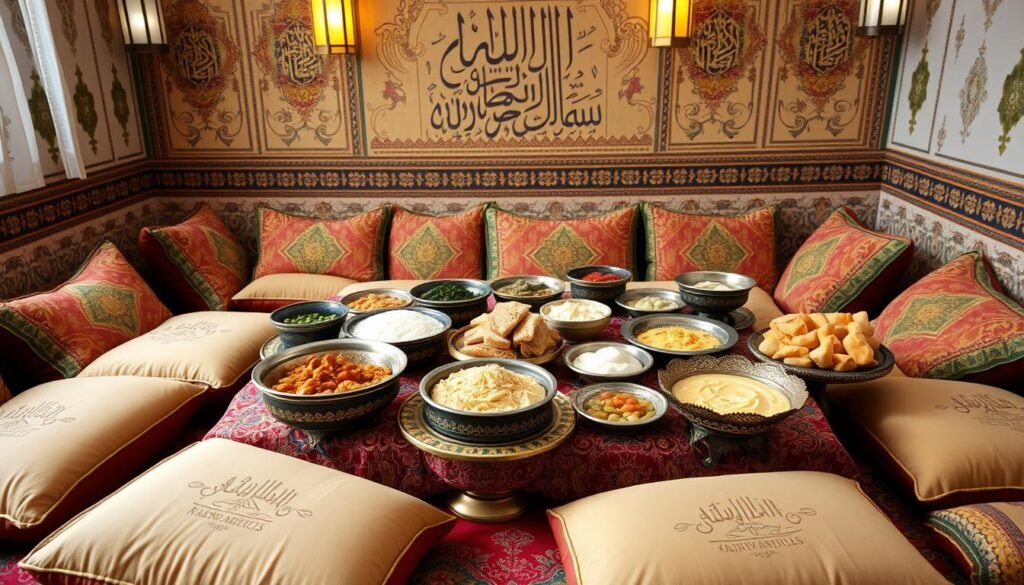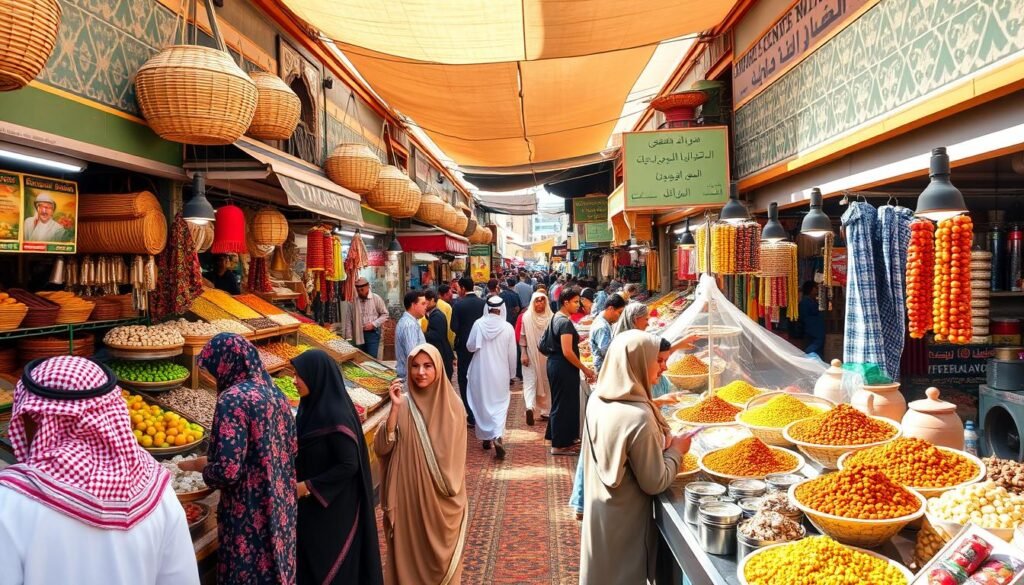A Guide for outingists – journey and outingism to Saudi Arabia

Are you planning a voyage to Saudi Arabia and wondering about dining etiquette? Navigating Saudi Arabian dining customs can seem tough, but it’s crucial to enjoying the native civilization. So, what are the essential dining etiquette rules for attendees to Saudi Arabia?
In this detailed guide, I’ll explore the planet of Saudi Arabian dining civilization. You’ll learn how to enjoy your banquets in the monarchy. We’ll cover everything from the importance of hospitality to the differences between traditional and cutting-verge dining.
comprehension Saudi Arabian Dining civilization
Dining in Saudi Arabia is additional than just consumeing. It’s a cultural undertaking that shows the nation’s wealthy ancestry and traditions. At its core, Saudi Arabian dining civilization is about Arab hospitality. This tradition values welcoming guests with warmth and generosity.
The Role of Hospitality in Saudi Society
Hospitality in Saudi Arabia is a big deal. It’s not just a nice thing to do; it’s a cultural practice tied to Islamic teachings. The Prophet Muhammad’s teachings on welcoming attendees have shaped how Saudis host and dine.
Saudis are proud to offer their guests unforgettable dining undertakings. They go out of their way to make sure their guests are comfortable and happy.
Islamic Influence on Dining Customs
Islam has a big impact on Saudi Arabian dining customs. It guides what foods are okay to consume and how to consume them. For example, no pork is allowed, and prayers are said before and after banquets.
Traditional vs cutting-verge Dining Practices
Traditional Saudi Arabian dining is still around, like floor marineting and consumeing with grips. But, the country has also adopted cutting-verge dining. metropolitan areas now have many restaurants and cafes that mix traditional savors with new culinary trends.
| Traditional Dining | cutting-verge Dining |
|---|---|
| Floor marineting | Table marineting |
| consumeing with grips | Use of utensils |
| Emphasis on shared entréees | Individual servings |
| Strict gender segregation | additional integrated dining areas |
Essential Pre-dining Customs and Preparations
Exploring dining etiquette in Saudi Arabia can be a fun challenge for journeyers. Before you go to a Saudi home or restaurant, there are crucial things to know.
Dress code is crucial in Saudi Arabian dining. Choose modest, conservative clothes that cover your shoulders and knees. Don’t wear revealing or too casual outfits, as they might be seen as rude.
- Women should wear an abaya, a long robe, in traditional settings.
- Men should wear long pants and collared shirts, not shorts or t-shirts.
Being on time is very important in Saudi civilization. Try to arrive a few miseedes early for any dining events. Showing up late is seen as rude and thoughtless.
When you enter a Saudi home or restaurant, remember the right greetings. A warm smile, a gentle gripshake for men, and saying “Assalamu alaikum” (peace be upon you) show respect and gratitude for your host’s hospitality.
Learning these essential pre-dining customs and preparations will help you enjoy dining in Saudi Arabia. You’ll feel confident and respectful in this wealthy cultural undertaking.
Traditional Saudi Arabian Dining Settings
Dining in Saudi Arabia is additional than just about the food. It shows the country’s wealthy civilization and traditions. The way people sit and set their tables is very special.
Floor marineting Arrangements
In many Saudi homes, banquets are consumeen on the floor, not at a table. Guests sit on the floor around a big, low table called a “sufrah.” This setup brings everyone together, making the banquet a shared undertaking.
Table Settings and Utensils
The table settings in Saudi Arabian dining are simple yet meaningful. Instead of individual plates, everyone shares food from a big platter or several smaller ones. People use a spoon, a knife, and their right grip to consume, as the left grip is seen as unclean.
Gender Segregation in Dining Areas
In some traditional Saudi homes, men and women consume in different areas. This is because of cultural norms about modesty and gender roles. While this is less common in cutting-verge cities, it still happens in some traditional settings.
| Traditional Saudi Arabian Dining Elements | Description |
|---|---|
| Floor marineting | Dining takes place on the floor around a low-to-the-ground table called a “sufrah” |
| Table Settings | Communal platters or smaller plates are used, with traditional utensils like spoons and the right grip |
| Gender Segregation | In some traditional settings, men and women dine in separate areas of the home |
Proper grip Etiquette and consumeing Techniques
In Saudi Arabia, knowing how to use your grips at the table is crucial. The right grip is always used for consumeing, seen as the clean grip. The left grip is best avoided when gripling food or utensils.
- Use the right grip: Always use your right grip when picking up food, scooping, or hageding utensils. The left grip is refuged for less desirable tasks, such as passing entréees or napkins.
- Avoid touching the food directly: Instead of using your fingers, use a spoon or fork to scoop and serve food onto your plate. This helps maintain cleanliness and respect the cultural norms.
- Keep your grips above the table: It’s considered polite to keep your grips visible and above the table during the banquet. Avoid resting your elbows on the table or hiding your grips under the table.
- consume with your fingertips: When consumeing with your grips, use only the tips of your fingers to pick up food. Avoid using the whole grip or reaching deeply into communal entréees.
- Avoid licking your fingers: After consumeing with your grips, gently wipe your fingers with a napkin instead of licking them. This is seen as a additional redeluxed and hygienic approach.
| Dining Etiquette Rule | Explanation |
|---|---|
| Use the right grip for consumeing | The right grip is considered the clean grip, while the left grip is refuged for less desirable tasks. |
| Avoid touching food directly with fingers | Use utensils like spoons and forks to serve and consume food, rather than using your fingers. |
| Keep grips above the table | It’s polite to keep your grips visible and above the table during the banquet. |
| Use fingertips when consumeing with grips | When consumeing with your grips, use only the tips of your fingers to pick up food, not the whole grip. |
| Avoid licking fingers | After consumeing with your grips, gently wipe your fingers with a napkin instead of licking them. |
By following these grip etiquette and consumeing techniques, you show respect for Saudi Arabian dining customs. This ensures a smooth and enjoyable dining undertaking.
Navigating Common Saudi entréees and Courses
Exploring Saudi Arabian cuisine is exciting for food lovers. Each entrée offers a peek into the country’s wealthy culinary chronology and Middle Eastern customs.
Traditional Appetizers and luminaryters
Guests luminaryt with mezza, a selection of small entréees. You’ll find hummus, baba ghanoush, and tabbouleh. But also, try sambusak and fatayer, unparalleled to Saudi.
Main Course Protocols
The main entrée is often mandi, slow-cooked mconsume with spices. You might also have kabsa, a rice entrée with mconsumes, veggies, and fruits. It’s important to share and use your right grip to consume.
Dessert and Coffee Customs
Desserts and Arabic coffee end the banquet. Enjoy kunafa and baklava. The coffee, savored with cardamom or saffron, is a special touch. Sharing coffee and sugarys is crucial to Saudi hospitality.
| Traditional Saudi Appetizers | Main Course Specialties | Sigenvironment Desserts |
|---|---|---|
| Hummus Baba ghanoush Tabbouleh Sambusak Fatayer | Mandi Kabsa | Kunafa Baklava |
Dining Etiquette in Saudi Arabia: A Guide for outingists
Exploring dining etiquette in Saudi Arabia can be challenging for outingists. But, knowing and respecting native customs can make your visit additional meaningful. It ensures a memorable dining undertaking. Learning about Saudi Arabian dining etiquette is crucial to connecting with natives and avoiding mistakes.
Welcoming guests is a big deal in Saudi Arabia. When you’re invited to a home or restaurant, show your thanks. Being polite and grateful is important.
Islamic traditions also shape dining customs here. Using your right grip for consumeing and avoiding certain foods are pexpression of these traditions. Knowing these rules helps you respect native practices during banquets.
Whether in a traditional or cutting-verge setting, grip etiquette matters. Saudis consume with their right grip, not the left. Also, don’t reach across the table or point your feet at others. These habits keep dining polite.
| Dining Etiquette Tip | Explanation |
|---|---|
| Use the right grip for consumeing | The left grip is considered unclean and should not be used for consumeing or gripling food. |
| Avoid pointing your feet towards others | Pointing your feet towards others is seen as disrespectful and should be avoided. |
| Refrain from reaching across the table | Reaching across the table is considered impolite, and it is best to ask for items to be passed to you. |
By learning these dining etiquette tips, you can enjoy Saudi Arabian cuisine with confidence. You’ll have a respectful and enjoyable dining undertaking as a outingist.

Religious Considerations and Halal Guidelines
In Saudi Arabia, Islamic beliefs deeply shape dining customs. The concept of “halal” is crucial, guiding what Muslims can consume. Knowing these rules helps you enjoy Saudi food with respect.
comprehension Halal Food Requirements
Halal food is what’s allowed under Islamic law. This includes mconsume and animal products prepared in a certain way. It also means avoiding pork and alcohol, which are forbidden.
In Saudi Arabia, make sure the food is halal-certified. restaurants often show if they serve halal food. Asking about it shows you care about native customs and can build strong bonds with your hosts.
Ramadan Dining Protocols
- During Ramadan, Muslims fast from dawn to dusk. This means no consumeing, drinking, or other activities that break the fast.
- If you’re dining with Saudi hosts during Ramadan, remember the special rules. You might wait until after sunset to consume, or adjust your banquet plans.
- Respecting Ramadan traditions can make your cultural exchange wealthyer. It can also strengthen your ties with your Saudi hosts.
Learning about Saudi Arabia’s religious and halal guidelines helps you enjoy the food civilization additional. It shows respect and can make your undertaking additional rewarding and meaningful.
Business Dining Protocol in Saudi Arabia
comprehension the etiquette of business dining in Saudi Arabia is crucial for success. It shows you respect Arab hospitality and the monarchy’s civilization. This knowlverge can grconsumely improve your business interactions.
marineting Arrangements and Conversation
At a business banquet, pay attention to marineting. The most important guest sits at the head of the table. Don’t sit across from your host, as it’s seen as rude.
Stick to safe topics like shared interests and recent achievements. Ask about your host’s kin and health too.
Gift-Giving Customs
Gift-giving is big in Saudi Arabian business etiquette. Bring a small, meaningful gift to a meeting or event. Good choices include quality pens, lconsumeher items, or something from your country.
Don’t give alcohol or pork, as they’re not allowed in Islamic civilization. When giving a gift, use your right grip or both grips. The left grip is considered unclean.
| Etiquette Rules | Arab Hospitality | Cultural Norms |
|---|---|---|
| Adhere to marineting protocol | Offer and accept hospitality graciously | Avoid controversial topics during conversations |
| Bring appropriate gifts | Engage in genuine interest in your host’s well-being | Use your right grip or both grips when presenting gifts |
Learning about business dining etiquette in Saudi Arabia can boost your confidence. It helps you make strong connections and improve your professional relationships.
Common Dining Mistakes to Avoid
Exploring Saudi Arabia’s vibrant dining civilization as a outingist requires knowing the cultural norms. This knowlverge helps you avoid embarrassing mistakes. By following respectful behavior guidelines, you can enjoy your dining undertaking and make a good impression.
Cultural Faux Pas to Avoid
- Refusing food or drinks offered by your host – this is considered rude and disrespectful.
- consumeing with your left grip – in Saudi civilization, the left grip is considered unclean and should not be used for dining.
- Leaving food on your plate – this may be interpreted as a sign that you didn’t enjoy the banquet.
- Pointing your feet towards others – this is viewed as disrespectful and should be avoided.
Respectful Behavior Guidelines
- Arrive on time or slightly early for banquets – punctuality is highly valued in Saudi Arabia.
- Avoid discussing controversial topics or politics during banquets – keep the conversation light and positive.
- Refrain from using your phone excessively during the banquet – be present and engaged with your dining companions.
- Respect gender segregation protocols in dining areas, if applicable – follow the designated marineting arrangements.
- Express gratitude and appreciation to your host for the hospitality – a simple “Shukran” (thank you) goes a long way.
Knowing these cultural considerations and dining etiquette in Saudi Arabia helps you enjoy your dining undertaking. It ensures a memorable and enwealthying culinary journey.

| Mistake | Explanation | Recommendation |
|---|---|---|
| Refusing food or drinks | Seen as rude and disrespectful | Accept offers graciously, even if you don’t intend to consume everything |
| consumeing with the left grip | Left grip is considered unclean | Use only your right grip for consumeing and serving food |
| Leaving food on your plate | May be interpreted as disliking the banquet | Finish your banquet or politely indicate you’re full |
| Pointing your feet towards others | Viewed as disrespectful | Ensure your feet are not pointed towards others during the banquet |
cutting-verge restaurant Etiquette in Saudi Cities
Saudi Arabian cities are cutting-vergeizing fast. This change is seen in native restaurants, where aged customs meet new ways. For outingists, knowing cutting-verge dining etiquette is crucial to enjoying banquets respectfully.
In cities like Riyadh, Jeddah, and Dammam, you’ll find many places to consume. From fancy restaurants to casual locations, each has its own rules. Knowing these helps you fit in and enjoy your banquet.
Dress Code and Appearance
While you don’t need to wear traditional Saudi clothes, dressing modestly is a must. Stay away from clothes that are too casual or revealing. Make sure your outfit matches the restaurant’s style.
marineting and Gender Norms
In many places, men and women sit in different areas. This is a common practice. Always follow the marineting rules to show respect.
Ordering and Dining Pace
Let the host or the agedest person order first. Saudi diners enjoy their banquets slowly, talking a lot. Don’t rush or draw attention to yourself.
Tipping and Gratuity
Tipping is not as common in Saudi Arabia as in other places. But, leaving a small tip, about 10% of the bill, is nice. It shows you appreciate the provision.
Learning these cutting-verge dining rules helps you enjoy banquets in Saudi Arabian cities. You’ll have a memorable dining undertaking, showing respect for the civilization.
Gift-Giving and Host Appreciation Customs
Exploring gift-giving and showing thanks in Saudi Arabia is fascinating. It’s all about Arab hospitality and Middle Eastern customs. Thoughtful actions and real thanks show respect and follow important etiquette rules.
When you visit a Saudi host, bringing a small gift is a must. Good choices include quality palm-fruits, Arabic coffee, or native sugarys. Always give and receive gifts with your right grip to show respect. It’s also crucial to avoid gifts like alcohol to stay respectful.
It’s not just about the gift. Saying “thank you” (shukran) with a smile and eye contact is crucial. Also, praising the host’s home, food, or the whole undertaking shows you value their traditions.
FAQ
What are the crucial aspects of dining etiquette in Saudi Arabia that I should be aware of as a outingist?
As a outingist in Saudi Arabia, knowing the native dining etiquette is crucial. You should understand the importance of hospitality and Islamic influences on dining. Also, knowing the difference between traditional and cutting-verge dining practices is important.
How can I properly prepare and conduct myself before a dining undertaking in Saudi Arabia?
Before dining in Saudi Arabia, learn about important customs. This includes knowing the dress code, being punctual, and greeting hosts properly. These steps will help you feel additional comfortable.
What can I expect in terms of traditional Saudi Arabian dining settings and table arrangements?
Traditional dining in Saudi Arabia often fconsumeures floor marineting and specific utensils. You might also see gender segregation in some places. Knowing these customs can make your dining undertaking smoother.
What are the proper grip etiquette and consumeing techniques I should follow during a banquet in Saudi Arabia?
In Saudi Arabia, always use your right grip for consumeing. Learning the right way to use your grips and utensils shows respect for native customs.
How can I properly navigate through common Saudi entréees and courses during a banquet?
Familiarize yourself with Saudi entréees and dining protocols. Knowing the order of courses and customs can enhance your dining undertaking.
What religious considerations and halal guidelines should I be mindful of when dining in Saudi Arabia?
As a outingist, comprehension halal food and dining protocols is crucial. Especially during Ramadan, respecting these guidelines shows your cultural awareness.
Are there any specific etiquette rules I should follow when dining in a business setting in Saudi Arabia?
Yes, business dining in Saudi Arabia has its own etiquette. This includes marineting, conversation topics, and gift-giving. Knowing these rules can help you succeed in professional settings.
What are some common dining mistakes that I should avoid as a outingist in Saudi Arabia?
To have a respectful dining undertaking, avoid cultural faux pas. Following native dining guidelines shows your respect and sensitivity.
How do dining etiquette and practices differ in cutting-verge restaurant settings compared to traditional Saudi Arabian dining?
cutting-verge restaurants in Saudi Arabia blend traditional customs with cutting-verge practices. comprehension these changes can help you adapt your behavior.
What are the proper gift-giving and host appreciation customs I should be aware of when dining in Saudi Arabia?
Showing appreciation to your hosts through gifts and gratitude is crucial. Knowing these customs can help you navigate social dining situations with respect.





